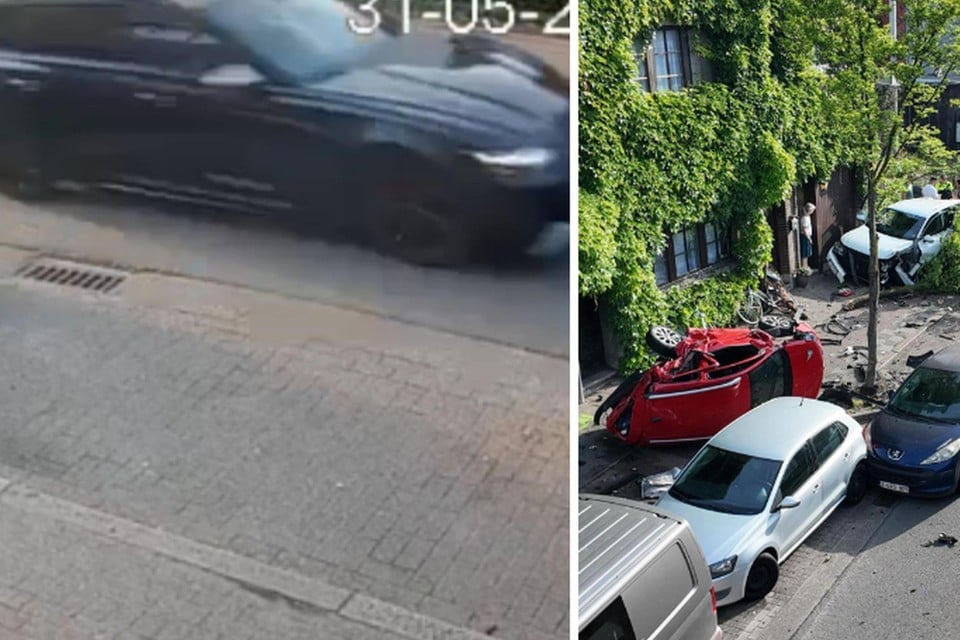Opinion | Cabinet, now prevent Israeli massage violence in Gaza
/s3/static.nrc.nl/images/gn4/stripped/data132854413-a3e368.jpg|https://images.nrc.nl/nTeCgI4ELNBl9jrvKsSa--fJ8z8=/1920x/filters:no_upscale()/s3/static.nrc.nl/images/gn4/stripped/data132854413-a3e368.jpg|https://images.nrc.nl/8OiFqQ6TBIWU24L7Itxx5j885qE=/5760x/filters:no_upscale()/s3/static.nrc.nl/images/gn4/stripped/data132854413-a3e368.jpg)
Last Sunday I was as an audience at the Peace Palace in The Hague, the House of the International Court of Justice (ICJ). A procession of one hundred thousand people passed by. They cried in red for justice. They walked past the Benjamin Ferencz-Pad, named after one of the most inspiring prosecutors of the Nuremberg Tribunal against the Nazi regime after WWII. His slogan, « law, not war‘, adorns a bench there. There is another motto on a street well: ‘Peace and Law. ‘
The indignation about what happens in Gaza was felt – and visible. Protest signs stated legal power terms: ‘Stop the Genocide », »Stop the war crimes. ‘ But nowhere I saw: ‘Stop the Crimes Against Humanity. ‘ Remarkable, because the loaded lens of genocide – and the technical ‘war crimes’ – is cloudy on the broader historical, legal and moral framework in which massage violence against citizens can be better described: that of crimes against humanity.
Essence of Human
In crimes against humanity, it is not – as with genocide – about questionable group categories, controversial nationalities and politicized national borders. And also not – as with war crimes – only about ‘civilian casualties’ of an armed conflict. As a dome category, crimes against humanity take on us all. They are an attack on the essence of being human. They are clearly defined in the status of Rome of the International Criminal Court (ICC), just like the Dutch International Crimes Act (Wim, 2003).
Crimes against humanity be about this law « A widespread or systematic attack directed against a civilian population, with knowledge of the attack. » The concept includes a complete register of criminal horrors: intentional dead, extermination, slavery, the cover of population groups, unlawful capture, torture, sexual violence, prosecution of an identifiable group or collectivity, forced disappearance, apartheid, and other inhuman actions of the similar suffering or intentional suffering suffering suffering or serious pure suffering suffering or intentional suffering suffering or serious pure sufferable suffering or intentional suffering or serious lengths suffering or serious lyvesful suffer suffer suffer or serious length of suffer suffer suffer suffer suffering or intentional suffer suffer suffer suffering or intentional suffer suffer suffer suffer or intentional suffering is caused. »
Every crime against humanity mentioned above, all of them, is one atrocityan atrocity – and every atrocity itself obliges us to intervene.
Nobody explains clearly that it is already about crimes against humanity anyway
The Criminal Court has been stating for some time that since 7 October 2023 the civilian population of Israel and Palestine are in any case targeted of systematically and widespread violence, also outside the armed conflict: first by Hamas, then by Israel. In various ways, the humanity of many has been denied and spent their feet. From Jewish citizens, Islamic citizens, atheists, Israelis, Palestinians, anti-war activists. The Criminal Court files against Hamas leaders Yahya Sinwar, Mohammed Diab Ibrahim al-Masri and Ismail Haniyeh, and against Israeli Prime Minister Benjamin Netanyahu and Minister Yoav Gallant, are therefore about crimes against humanity, mockion, rape and other inmen.
Those crimes against humanity resemble genocide. And many genocide experts mix the two legal concepts. Genocide is usually also part of crimes against humanity. But peoples confess – again according to the Wim – violence with the « intention to destroy a national, ethnic, (racial) or religious group, in whole or in part, as such. » The aim and the discriminatory character make genocide a special subcategory.
Read also
Seven renowned scientists almost united: Israel commits genocide in Gaza
Since a week, that G-word sounds everywhere: on radio and television, in graffiti on university stuff and on billboards above the theater on the corner. Experts speak of ‘genocidal violence’. Even the municipal councils of Utrecht and Amsterdam use the term To explain the situation in Gaza politics. But nobody explains clearly that it is already about crimes against humanity anyway.
Great faciefor example, the International Court of Appeal (ICJ), there are strong indications for three of the five criminal acts from the genocidalconvention and the international crimes law: killing, causing serious physical or mental injury, and deliberately creating living conditions aimed at destruction of Palestinians. That observation makes the violence ‘genocidal’, as my colleague Uğur Üngör right. Legally, the question remains whether the ICJ will qualify all this as a genocide. That will take a while.
Group destruction
The core condition to be able to speak of genocide is the racist ‘purpose’ to group destruction. This condition – also Dolus Specialis Handed – requires in -depth analysis of policy, statements and intentions of individual perpetrators. Judges have been struggling with it for decades. I saw it happening when I attended the genocide processes of Radovan Karadzic (Srebrenica), Théoneste Bagosora (Rwanda) and Nuon Chea (Cambodia) as a process observer. International prosecutors often ignore genocide consumes: too technical, too academic, too political.
The Nuremberg Tribunal-where international criminal law took shape-the persecution, deportation and extermination of Jews, Roma and Sinti initially fell under crimes against humanity. Ferencz mentioned these acts in the famous Einsatzgruppen-Process is ‘genocide’, but only as a power term. Crimes against humanity missed that gut feeling of moral discomfort. Genocide was only recorded as a separate crime in the very first human rights treaty of the United Nations in 1948. It mainly applies as a moral article article.
The current use of the G-word follows the rhetorical cleverness of Ferencz. It reinforces the moral apple to the cabinet to speak out to prevent further massage violence – as the genocide conflict prescribes. The word calls for responsibility. To action.
The Genocide lens polarizes, polarizes and academizes
But it is also problematic. It is precisely because it is so loaded that it is paralyzing. As long as proof of the required intention is not made, governments will shift their responsibility for intervention (such as in Rwanda, 1994). The red line that demonstrators ask for is then shifted to the future.
Another problem is that the Genocide lens politics-with an almost automatic identity policy going back to the Holocaust (almost no one refers to the genocides in Cambodia, Rwanda or Srebrenica). Moreover, it polarizes by dividing perpetrators and victims along identity lines. She also academizes: How do we explain historical processes?
In addition, genocide is a undressed concept. In 1948, the genocide nonsense was formulated in such a way that it did not clash with the interests of imperial powers: political and indigenous groups fell outside. Cultural destruction was deleted. That would otherwise offer too much protection to African-American civil rights movements, prisoners in the Soviet gooseags and independence fighters in Algeria.
Horror
Merely the use of the concept of genocide therefore narrows the debate, and leads to a standstill. It reduces the moral vocabulary to a binary judgment: whether or not a genocide. Such an essentialist approach leaves other atrocities unmentioned. While crimes against humanity weigh equally.
History shows that it was precisely the naming of crimes against humanity often the start of moral indignation, international solidarity and intervention. In 1890 the American historian George Washington Williams spoke about the horrors under Leopold II in Congo as crimes against humanity. His call led to the first international committee of inquiry in 1904 into the systematic practice of slavery, severed hands and kidnapped and raped women and children.
In 1915, the international community also qualified the persecution, deportation and mass slips of Armenians by the Ottoman regime as crimes against humanity. Even when it came to South Africa, the Soviet Union, the China of Mao, Argentina and the Balkans, this term was also used to name structural violence.
By making genocide facials, we become blind to the versatile dynamics of prosecution and extermination policy- which, if racist, can also be genocidal.
Change of international law
Crimes against humanity offer more room. They depoliticize the debate, focus on the actions that go against human dignity – not on the group identity of victims or intention of perpetrators. They enable judges and politicians to respond earlier (due to the lower burden of proof) and more precisely (due to the broader arsenal of concepts of violence), without paralyzing identity policy.
« Everyone will always have been against this, » a demonstrating student had chalked on a banner last week. Let that be the warning to the Dutch government, which presents itself as a guardian of international law.
Article 90 of the Constitution is required to promote the international legal order. This includes the current appointment of massage violence against citizens of that international rule of law. This requires moral, political and international precision. And requires a sharp and inclusive vocabulary to name the human tragedy – in addition to the fatal doom of genocide. Not afterwards, after a judicial judgment has been made), but now, now that the crimes against humanity are visibly taking place.

:format(webp)/s3/static.nrc.nl/wp-content/uploads/2025/05/15125434/data132228603-505b1f.jpg)
/s3/static.nrc.nl/images/gn4/data133030560-29bc73.jpg)
/s3/static.nrc.nl/wp-content/uploads/2025/05/31110246/Obit-Loretta-Swit_68195241.jpg)





